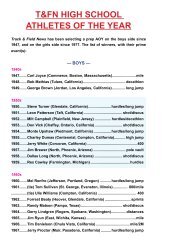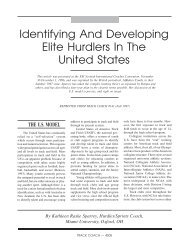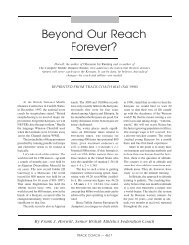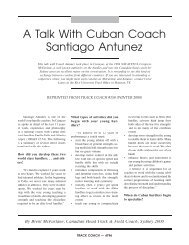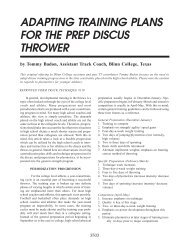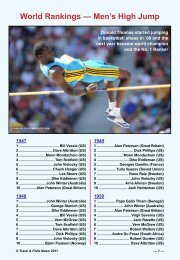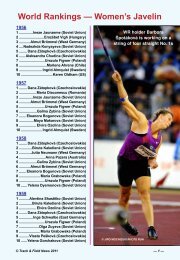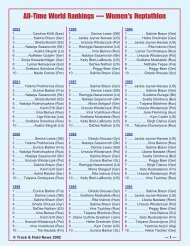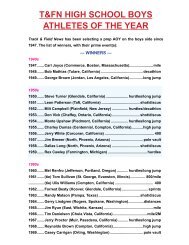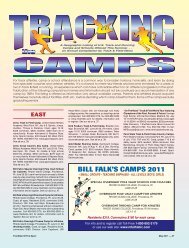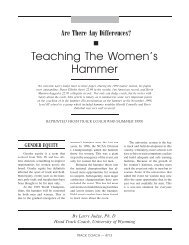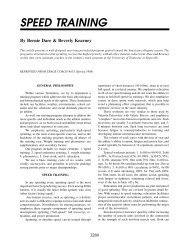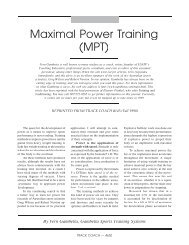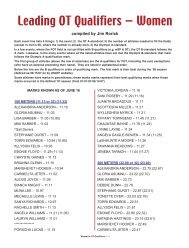DEALING WITH PRECOMPETITIVE ANXIETY - Track & Field News
DEALING WITH PRECOMPETITIVE ANXIETY - Track & Field News
DEALING WITH PRECOMPETITIVE ANXIETY - Track & Field News
You also want an ePaper? Increase the reach of your titles
YUMPU automatically turns print PDFs into web optimized ePapers that Google loves.
teammates for humorous small- talk as a way of reducing<br />
their anxiety. Allow them to go through the trialand-error<br />
of finding out what in best for them. Following<br />
this individual lime, bring them back together and<br />
summarize the team goals you hope to accomplish. In<br />
addition, incorporating individual time for the coaches<br />
is equally important for their preparation.<br />
4. Foster a performance-oriented attitude in<br />
your athletes. An was explained in Recommendations<br />
for Athletes, athletes need to focus on what they can<br />
control. So many factors beyond their control play a<br />
part as to whether they win. Placing a high priority on<br />
outcome results in unnecessary pressure and extra factors<br />
that athletes worry about. Unfortunately, a coach's<br />
livelihood is dependent upon outcome. Job stability<br />
and opportunity for professional advancement usually<br />
hinges on the win-loss record. As stated before, we are<br />
not implying that winning is unimportant. We are stating,<br />
however, that placing winning an the top priority<br />
can have negative effects on an athlete's mental preparation<br />
and subsequent performance. Remember, your<br />
greatest chance for a positive outcome is to have each<br />
athlete play at his/her potential. This can best be<br />
achieved by having your athletes focus on what they<br />
can control-their performance. Teaching athletes to<br />
appreciate the importance of gauging success by how<br />
well they perform according to their own potential<br />
rather than by other's standards is one of the greatest<br />
lessons a coach can teach.<br />
5. Be specific with your suggestions to help athletes<br />
with PCA. It is easy to create a situation where<br />
an athlete struggling with PCA starts to "worry about<br />
worrying." Be careful to keep helpful suggestions specific<br />
to the actions that the athlete finds troublesome,<br />
rather than identifying or characterizing the athlete by<br />
the weakness he/she demonstrates. If the athlete begins<br />
to view him/herself as a "choker," he/she creates a self<br />
fulfilling prophesy that will ensure further PCA. A<br />
coach can be extremely helpful in showing the athlete<br />
that it is only one part of his/her game and can be<br />
viewed as a challenge for improvement rather than a<br />
permanent birthmark.<br />
6. As your time allows, try to schedule periodic<br />
individual meetings that focus on the issue of mental<br />
training. Once again, don't underestimate the power<br />
of this gesture. You are letting them know that you<br />
view their mental training as important and you are<br />
there to help them in that regard. Most importantly, it<br />
breaks down the barrier that athletes may feel to always<br />
present themselves as mentally tough 100% of<br />
the time. Such meetings may remove concern athletes<br />
may have about being an imposter around you, constantly<br />
fearing what will happen "if coach finds out<br />
what I am really like." Let them know that dedicating<br />
time to their weaknesses as well as strengths will not<br />
jeopardize their position but contribute to their potential<br />
as an athlete.<br />
RECOMMENDATIONS FOR PARENTS<br />
1. Become aware of your own arousal levels and<br />
how they interact with your child. How many of us<br />
have experienced the extreme tension and anxiety associated<br />
with watching our child participate in sports?<br />
It is important to spend time reflecting on your own<br />
arousal levels as a way of understanding how they<br />
impact your child's enjoyment and performance in<br />
sports. Applying the suggestions in Recommendations<br />
for Athletes can help you deal with any anxiety you<br />
may experience.<br />
2. Foster a performance-oriented attitude in<br />
your young athlete. As parents, one of the easiest<br />
questions for us to ask our children after a competition<br />
is "Did you win?" Unfortunately, this question tends to<br />
foster an outcome-oriented attitude in children. Children<br />
pick up very quickly what are important measures<br />
of success. It is a parent's responsibility to gently guide<br />
them into measuring success by their ability to do the<br />
best that they can. Helping them focus on what they<br />
can control will be a major factor in reducing PCA for<br />
athletes as they grow and develop. This can be facilitated<br />
by asking them questions that encourage them to<br />
reflect on their performance, rather than the outcome.<br />
Refer to the other previous sections for further information<br />
about performance-versus outcome-orientations.<br />
3. Look for clues as to what their motivation is<br />
for participating in sport and its possible effect on<br />
PCA. Research has indicated that the vast majority of<br />
youth sports participants engage in athletics for fun<br />
being around their friends, and using their friends as a<br />
guide to comparing their own abilities. Winning actually<br />
is a low priority for youth as they first begin to<br />
participate in athletics. Does this profile fit your child?<br />
If not, look for the influences that may be directing<br />
your child. While you may not be able to change other's<br />
influences, you can certainly counterbalance them by<br />
bringing fun back into the purpose of athletics and<br />
focusing on their performance (see #1).<br />
If your child is becoming unusually nervous before<br />
a competition, it may be a sign that he or she is<br />
participating for reasons other than his/her own. We<br />
have worked with a number of children who have<br />
become acutely aware that they receive the most attention<br />
from their parents when they are participating in<br />
sports. Their number one reason for participating in sports<br />
is to seek approval from their parents. Before a competition,<br />
these children become very anxious because they<br />
are in conflict: "I don't really want to do this, but I want<br />
my parents to be proud of me." If this is characteristic of<br />
your child, reinforce the notion that your love for him/ her<br />
3516



